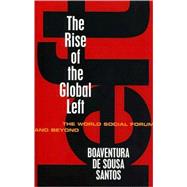
Note: Supplemental materials are not guaranteed with Rental or Used book purchases.
Purchase Benefits
What is included with this book?
| Tables and figures | p. viii |
| Preface | p. ix |
| Introduction: forty years of solitude and the novelty of the World Social Forum | p. 1 |
| The World Social Forum as critical utopia | p. 10 |
| The World Social Forum as epistemology of the South | p. 13 |
| The World Social Forum and the sociology of absences | p. 15 |
| The World Social Forum and the sociology of emergences | p. 29 |
| The World Social Forum as an insurgent cosmopolitan politics | p. 35 |
| The struggles for global social justice must be based on a very broad conception of power and oppression | p. 36 |
| Counter-hegemonic globalization is built upon the equivalence between the principles of equality and recognition of difference | p. 37 |
| Rebellion and non-conformity must be privileged to the detriment of the old strategic options (reform or revolution) | p. 38 |
| The WSF aims at a new internationalism | p. 38 |
| The WSF process progresses as transversal political terrains of resistance and alternative are identified as an ongoing process | p. 39 |
| The struggle for radical democracy must be a struggle for demo-diversity | p. 40 |
| Transcultural criteria must be developed to identify different forms of democracy and to establish hierarchies among them according to the collective quality of life they provide | p. 40 |
| The WSF process must be conceived as promoting and strengthening counter-hegemonic forms of high-intensity democracy that are already emerging | p. 41 |
| There is no democracy without conditions of democracy | p. 43 |
| There is no global social justice without global cognitive justice | p. 44 |
| The many names for another possible world - social emancipation, socialism, dignity, etc. - are in the end the name of democracy without end | p. 45 |
| Organizing fragmented counter-hegemonic energies | p. 46 |
| Internal democracy: relations between the Organizing Committee and the International Council | p. 48 |
| Transparency and hierarchies in participation | p. 51 |
| Parties and movements | p. 55 |
| Size and continuity | p. 57 |
| The new organizational challenges: the evaluation of the 2003 WSF | p. 58 |
| The new organizational models: the Mumbai demonstration and the 2005 WSF | p. 72 |
| The 2006 polycentric WSF | p. 80 |
| Representing this world as it fights for another possible world | p. 85 |
| Whom does the WSF represent? | p. 85 |
| Who represents the WSF? Composition and functionality of the International Council | p. 100 |
| Making and unmaking cleavages: strategy and political action | p. 110 |
| Reform or revolution | p. 111 |
| Socialism or social emancipation | p. 113 |
| The state as enemy or potential ally | p. 114 |
| National or global struggles | p. 115 |
| Direct or institutional action | p. 117 |
| The principle of equality or the principle of respect for difference | p. 119 |
| The WSF as a space or as a movement | p. 120 |
| The future of the World Social Forum: self-democracy and the work of translation | p. 127 |
| Self-democracy | p. 129 |
| The work of translation | p. 131 |
| The World Social Forum and self-learning: the Popular University of the Social Movements | p. 148 |
| A proposal for collective transformative self-learning: the Popular University of the Social Movements | p. 149 |
| The PUSM, 2003-06 | p. 154 |
| The left after the World Social Forum | p. 160 |
| The phantasmal relation between theory and practice | p. 160 |
| The twenty-first-century left: depolarized pluralities | p. 166 |
| Conclusion | p. 182 |
| Annexes | |
| Composition of the International Council of the WSF (2005) | p. 188 |
| Comparison between the Charter of Principles, the WSF India policy statement and the Charter of Principles and Values of the African Social Forum | p. 196 |
| Manifesto of Porto Alegre | p. 205 |
| Organizations and institutions that have provided financial support to the World Social Forums | p. 208 |
| Bibliography | p. 210 |
| Index | p. 216 |
| Table of Contents provided by Ingram. All Rights Reserved. |
The New copy of this book will include any supplemental materials advertised. Please check the title of the book to determine if it should include any access cards, study guides, lab manuals, CDs, etc.
The Used, Rental and eBook copies of this book are not guaranteed to include any supplemental materials. Typically, only the book itself is included. This is true even if the title states it includes any access cards, study guides, lab manuals, CDs, etc.